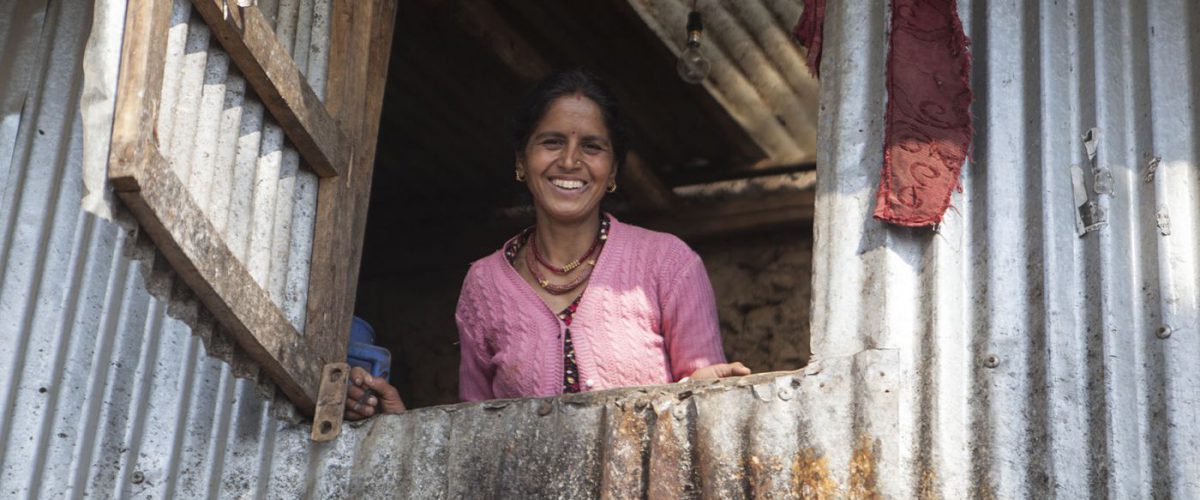Acting on ENERGIA’s commitment to Sustainable Energy for All, we are following up on our global campaign on energy, women, children and health with awareness raising and advocacy campaigns in five countries: Indonesia, Kenya, Nepal, Senegal and Tanzania. The aim of our Gender and Energy Advocacy Programme is to convince governments and donors to invest in gender informed energy programmes. To that end, our partners implement a range of activities: from taking part in special task forces and working together with governments at the national, regional and local level, to awareness raising campaigns that target the general public by conveying the importance of including and promoting women in the energy value chain and showing the impact of ENERGIA’s Women’s Economic Empowerment Programme. The diversity of activities within the scope of our Gender and Energy Advocacy Programme is illustrated below with selected examples from the past year.
Storytelling by social media buzzers in Indonesia
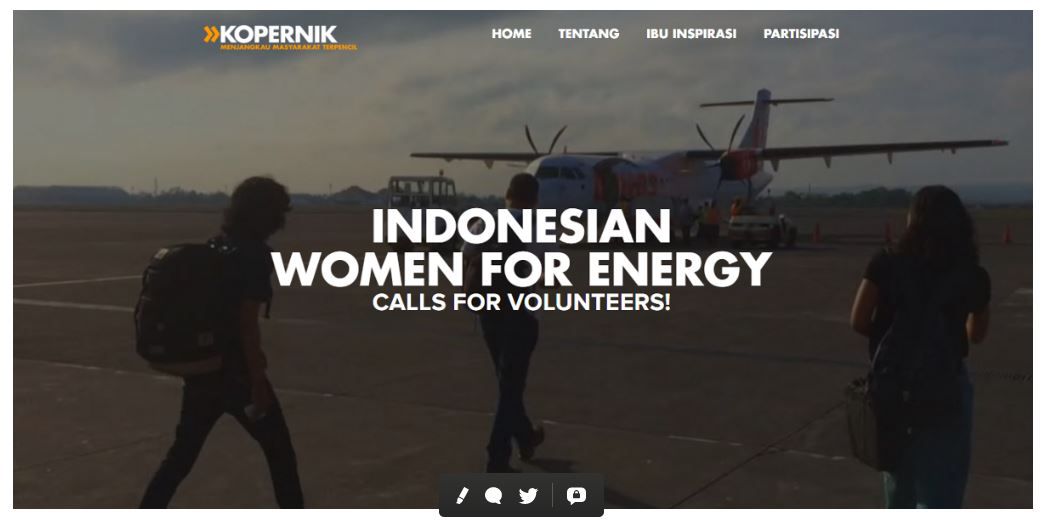 Kopernik expanded the reach of its advocacy through a volunteering programme that enlisted skilled storytellers with a wide social media audience. The #IDwomen4energy campaign included a contest which drew more than 100 applicants. They submitted one-minute videos explaining why they should be selected as volunteers who would live and work with three Wonder Women in East Flores. The volunteers then created compelling stories about their first-hand experience with the Wonder Women programme, and they shared those stories via their social networks. You can read about one of the volunteers’ experience in our earlier post. Kopernik reported that, “The three selected volunteers, also strong social media buzzers, could access a wider audience beyond Kopernik’s networks. Additionally, their continued engagement with their audience drove greater interest into our advocacy messages.“ This novel way of promoting women’s economic empowerment and energy access earned more than 10,000 engagements on social media. In addition, more than 18,000 people visited Kopernik’s website.
Kopernik expanded the reach of its advocacy through a volunteering programme that enlisted skilled storytellers with a wide social media audience. The #IDwomen4energy campaign included a contest which drew more than 100 applicants. They submitted one-minute videos explaining why they should be selected as volunteers who would live and work with three Wonder Women in East Flores. The volunteers then created compelling stories about their first-hand experience with the Wonder Women programme, and they shared those stories via their social networks. You can read about one of the volunteers’ experience in our earlier post. Kopernik reported that, “The three selected volunteers, also strong social media buzzers, could access a wider audience beyond Kopernik’s networks. Additionally, their continued engagement with their audience drove greater interest into our advocacy messages.“ This novel way of promoting women’s economic empowerment and energy access earned more than 10,000 engagements on social media. In addition, more than 18,000 people visited Kopernik’s website.
Engaging with the national government in Kenya
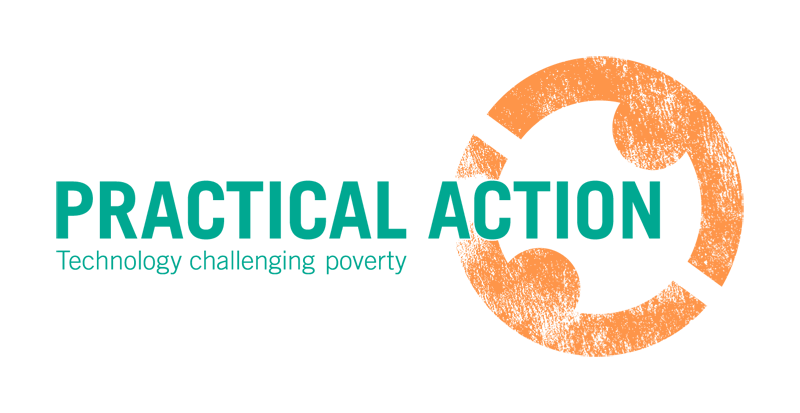 Having been appointed by the Ministry of Energy and Petroleum as the convener of civil society organisations (CSOs) in Kenya, Practical Action mobilised civil society to engage in the SEForAll process at the national level. Our partner collated CSOs’ views through workshops and direct communication with individual organisations, and presented them to the Ministry for consideration. In addition, Practical Action represented Kenyan CSOs and advocated for gender mainstreaming in the preparation of the SEForAll Action Agenda and Investment Prospectus. As a result, key documents adopted by the government prioritise modern cooking solutions, aim for enhancing the participation of women in energy development, and indicate the need for a comprehensive study to provide sex disaggregated data on energy to inform the sector, among other things. The process of developing energy related policies and documents has also brought recognition of the need for gender mainstreaming in other development sectors. Practical Action continues to support gender mainstreaming in SEForAll country-level energy planning.
Having been appointed by the Ministry of Energy and Petroleum as the convener of civil society organisations (CSOs) in Kenya, Practical Action mobilised civil society to engage in the SEForAll process at the national level. Our partner collated CSOs’ views through workshops and direct communication with individual organisations, and presented them to the Ministry for consideration. In addition, Practical Action represented Kenyan CSOs and advocated for gender mainstreaming in the preparation of the SEForAll Action Agenda and Investment Prospectus. As a result, key documents adopted by the government prioritise modern cooking solutions, aim for enhancing the participation of women in energy development, and indicate the need for a comprehensive study to provide sex disaggregated data on energy to inform the sector, among other things. The process of developing energy related policies and documents has also brought recognition of the need for gender mainstreaming in other development sectors. Practical Action continues to support gender mainstreaming in SEForAll country-level energy planning.
Working with schools and pupils in Nepal
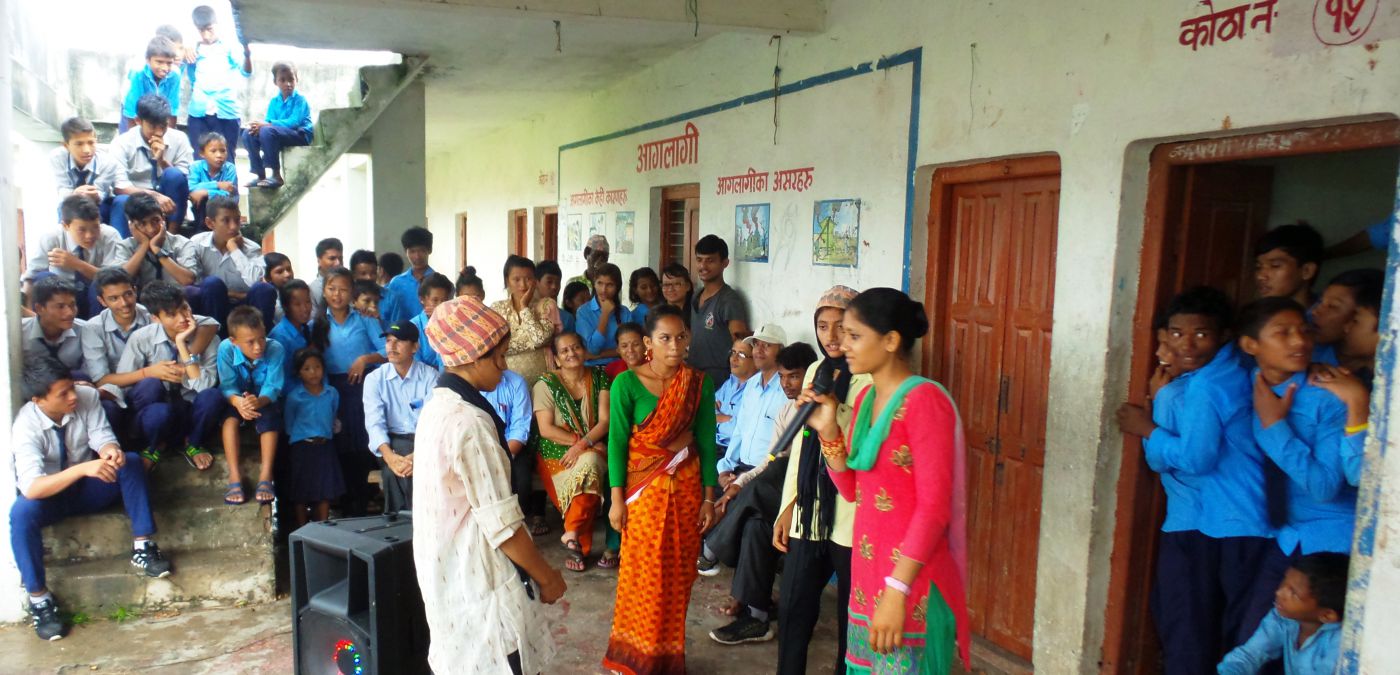 The Centre for Rural Technology Nepal (CRT/N) adopted a creative approach to raising awareness on the importance of sustainable energy. Young people, their parents and educators were the audience of a play that promoted the use of clean cookstoves. The play, seen by more than 4,000 people so far, highlights that improved cookstoves are better for people’s health as well as for the environment. Additionally, CRT/N developed a special flip chart, posters and banners about renewable energy sources and technologies that have been distributed to Nepalese schools, and they have made significant progress in their efforts to include energy related education in the primary school curriculum. Among other outcomes, CRT/N reports that, “Schools have started demanding sensitisation of students and teachers regarding clean cookstoves and sustainable energy, and we have been receiving a number of requests for teaching materials.” You can learn more in an earlier post
The Centre for Rural Technology Nepal (CRT/N) adopted a creative approach to raising awareness on the importance of sustainable energy. Young people, their parents and educators were the audience of a play that promoted the use of clean cookstoves. The play, seen by more than 4,000 people so far, highlights that improved cookstoves are better for people’s health as well as for the environment. Additionally, CRT/N developed a special flip chart, posters and banners about renewable energy sources and technologies that have been distributed to Nepalese schools, and they have made significant progress in their efforts to include energy related education in the primary school curriculum. Among other outcomes, CRT/N reports that, “Schools have started demanding sensitisation of students and teachers regarding clean cookstoves and sustainable energy, and we have been receiving a number of requests for teaching materials.” You can learn more in an earlier post
Enlisting celebrity and media support in Senegal
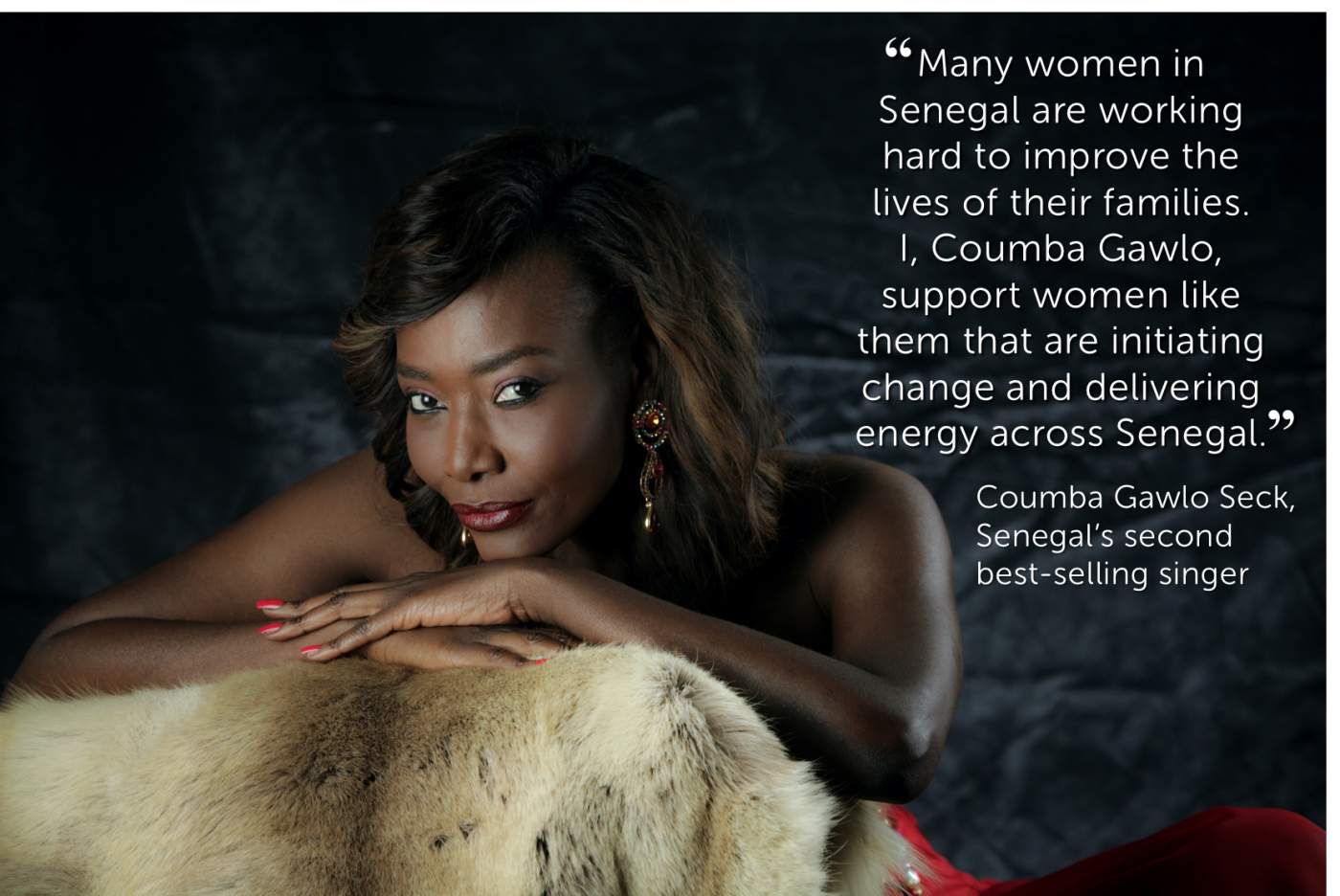 To raise awareness of the link between gender and energy and to enhance the involvement of women in energy policies and programmes, Energy 4 Impact launched two media kits: a social media kit with photos, infographics, tweets and other materials, as well as a press pack with different story ideas and background information. Previously, Energy 4 Impact had won the support of Coumba Gawlo, one of the best-selling Senegalese singers, who has been acting as a Women’s Economic Empowerment Ambassador. As a result of her support, the two media kits and Energy 4 Impact’s online posts, Senegalese media featured multiple relevant stories. One of the topics covered was how access to solar refrigeration makes a difference for shop vendors and women entrepreneurs in the field of agro-processing. Mainstream and online media also reacted favourably to a press release about the importance of women in scaling up energy access that was endorsed by the famous singer. Those stories are estimated to have reached more than 2.5 million readers.
To raise awareness of the link between gender and energy and to enhance the involvement of women in energy policies and programmes, Energy 4 Impact launched two media kits: a social media kit with photos, infographics, tweets and other materials, as well as a press pack with different story ideas and background information. Previously, Energy 4 Impact had won the support of Coumba Gawlo, one of the best-selling Senegalese singers, who has been acting as a Women’s Economic Empowerment Ambassador. As a result of her support, the two media kits and Energy 4 Impact’s online posts, Senegalese media featured multiple relevant stories. One of the topics covered was how access to solar refrigeration makes a difference for shop vendors and women entrepreneurs in the field of agro-processing. Mainstream and online media also reacted favourably to a press release about the importance of women in scaling up energy access that was endorsed by the famous singer. Those stories are estimated to have reached more than 2.5 million readers.
Showcasing change makers in Tanzania
Solar Sister took global advocacy efforts to communities across Tanzania by rolling out the Women and Energy: WE Shine campaign. The campaign aims to raise awareness about the benefits of energy access and economic opportunity for women, by raising the voice of women entrepreneurs in the energy value chain and providing inputs on strategies and success stories to support the integration of women in Tanzania’s Sustainable Energy for All Action Agenda. Among other campaigning activities, Solar Sister released and widely promoted video portraits of six economically empowered women who have been improving the wellbeing of their communities through clean energy technologies: Hadija, a farmer; Esupati, a nurse; Valentina, a community leader; Hilaria, a business woman; Beatrice, an educator; and Chrecensia, an entrepreneur. In addition to the online video portraits and social media content, Solar Sister developed a nationwide radio campaign which reached around two million people.
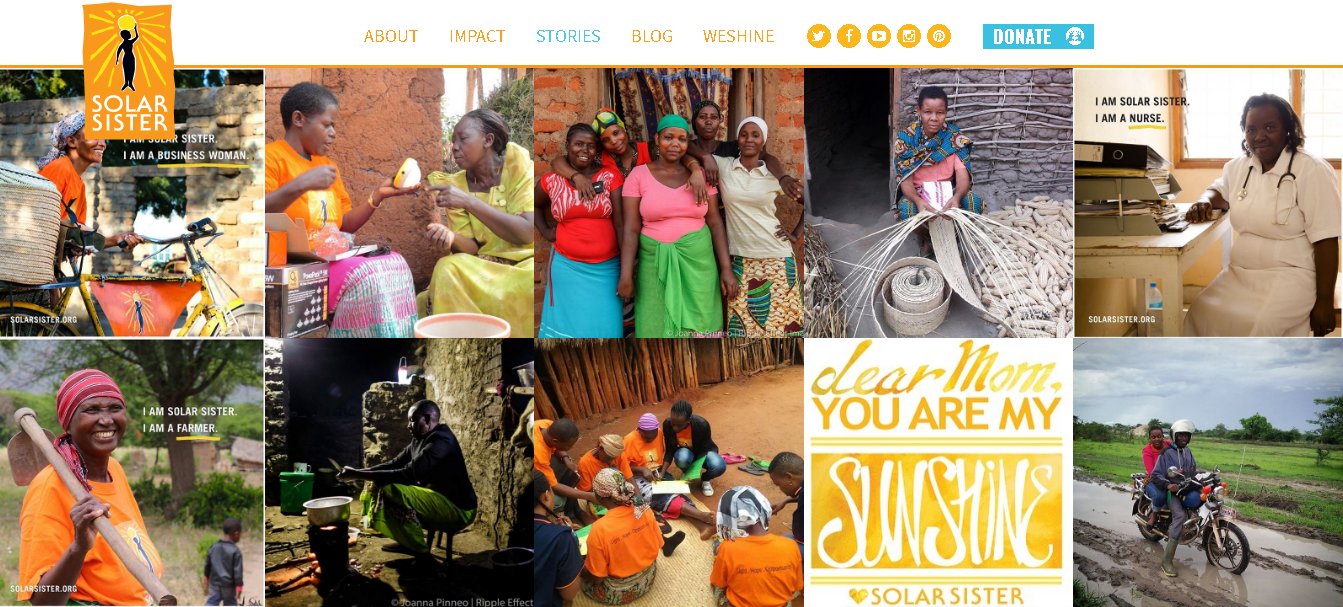
Our partners will continue to implement the Gender and Advocacy Programme over the coming months, and we will present additional activities on our website, so do stop by on a regular basis.


